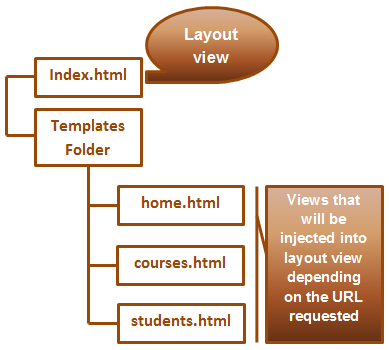AngularJS routing tutorial:-
In general, as the application becomes complex you will have more than one view in the application. Let's say you are building a single page application for a training institute and you have the following views
- Home
- Courses
- Students
We can take advantage of the Angular routing feature, to have a single layout page, and then inject and swap out different views depending on the URL the end user has requested.
So in our application we will have the following views

index.html is the layout view
home.html, courses.html & students.html will be injected into the layout view(index.html) depending on the URL the end user has requested
For example, if the user has requested http://localhost:51983/home, then home.html will be injected into the layout view (index.html). Similarly if the user has requestedhttp://localhost:51983/courses, then courses.html will be injected into the layout view (index.html).
Preparing the angular application application to use routing : The AngularJS Route module is present in a separate JavaScript file. You can either download it from AngularJs.org and use it in the application or you can use the CDN link.
- Home
- Courses
- Students
We can take advantage of the Angular routing feature, to have a single layout page, and then inject and swap out different views depending on the URL the end user has requested.
So in our application we will have the following views

index.html is the layout view
home.html, courses.html & students.html will be injected into the layout view(index.html) depending on the URL the end user has requested
For example, if the user has requested http://localhost:51983/home, then home.html will be injected into the layout view (index.html). Similarly if the user has requestedhttp://localhost:51983/courses, then courses.html will be injected into the layout view (index.html).
Preparing the angular application application to use routing : The AngularJS Route module is present in a separate JavaScript file. You can either download it from AngularJs.org and use it in the application or you can use the CDN link.